
Melolontha is a genus of beetles in the family Scarabaeidae. The European cockchafers belong to this genus.
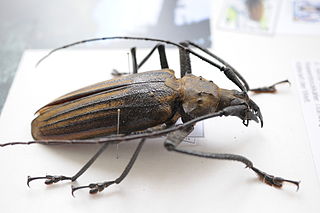
Xixuthrus is a small genus of long-horned beetles, found primarily on Pacific islands, including Indonesia, New Guinea, the Solomon Islands, and Fiji, and contains some of the largest living insect species, the giant Fijian long-horned beetle and the Taveuni beetle. These beetles have powerful jaws, and should be handled with care when alive. No scientists have yet seen a larva of this genus, although in Fiji, where three different species occur, the natives consider them to be a rare and special delicacy.

Rosalia is a genus of longhorn beetles in the family Cerambycidae.

Macrodontia is an American genus of long-horned beetles remarkable for their large size and for the large mandibles of the males in particular.
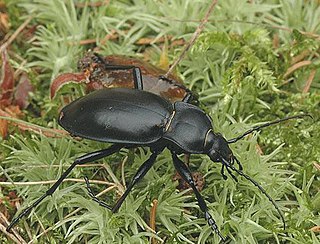
Carabus is a genus of beetles in family Carabidae. The genus is highly diverse with 94 subgenera, 959 species and 2300 subspecies, thus is the largest genus in the subfamily Carabinae. The vast majority are native to the Palearctic, but 16 Nearctic species are also known. Carabus spp. are 12–50 mm (0.47–1.97 in) long, and most species are wingless and often very colourful. These are nocturnal, predatory beetles that feed on snails, earthworms, and caterpillars. Most Carabus species were thought to have inhabited the Eurasian forest, but the species' low dispersal abilities altered the distribution of lineages within the genus.

Lepturinae, the lepturine beetles, is a subfamily of the longhorn beetle family (Cerambycidae), containing about 150 genera worldwide. This lineage is most diverse in the Northern Hemisphere. Until recently the subfamily Necydalinae was included within the lepturines, but this has been recently recognized as a separate subfamily. Nine tribes are usually recognized today, with a tenth, Caraphiini, created in 2016. A few genera are of uncertain placement within the subfamily.

Agonum is a large genus of ground beetles in the subfamily Harpalinae, tribe Platynini. They are mid-sized to smallish beetles, typically with dark metallic hues – often reddish or bronze, but sometimes black, green etc.
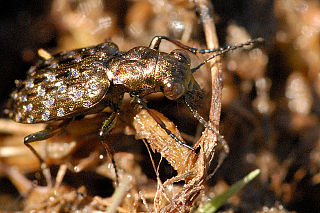
Elaphrus is a genus in the beetle family Carabidae. There are at least 40 described species in Elaphrus.

Cymindis is a genus of ground beetle native to the Palearctic, the Near East, and North Africa. It contains the following species:

Polyphylla is a genus of scarab beetle includes more than 80 species distributed in North and Central America, southern and central Europe, northern Africa, and southern Asia—from Asia Minor to Japan. They typically reside in forests and orchards with most being identified by white elytra scales forming stripes. The adult beetles are often attracted to lights. Polyphylla lay their eggs on soil near plants from where the larvae hatch and burrow down to the roots on which they will feed. They reach maturity in two to three years.

Saperda is a genus of flat-faced longhorn beetles belonging to the family Cerambycidae, subfamily Lamiinae. The genus was erected by Johan Christian Fabricius in 1775.
Diplous is a genus of ground beetles in the family Carabidae. There are more than 20 described species in Diplous.

Leptura is a genus of beetles in the family Cerambycidae, containing the following species:

Stictoleptura is a genus of longhorn beetle in the family Cerambycidae.
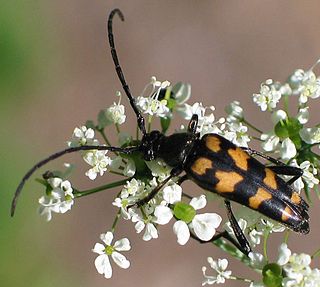
Strangalia is a genus of beetles in the family Cerambycidae, containing the following species:

Trachyderini is a tribe of long-horned beetles in the family Cerambycidae. There are at least 140 genera and 650 described species in Trachyderini.

Dorysthenes is a genus of longhorn beetles of the subfamily Prioninae.

Aegosoma is a genus of long-horned beetles belonging to the family Cerambycidae.
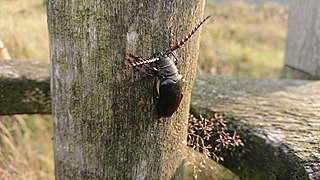
Prionus laticollis, also known as the broad-necked root borer or broad necked prionus, is a root-boring longhorn beetle described by Dru Drury in 1773. It is widespread throughout eastern North America: its range covers a vast swath from Quebec in the northeast to Arkansas in the southwest.

Tetropium is a genus of long-horned beetles in the family Cerambycidae. There are at least 20 described species in Tetropium.




















